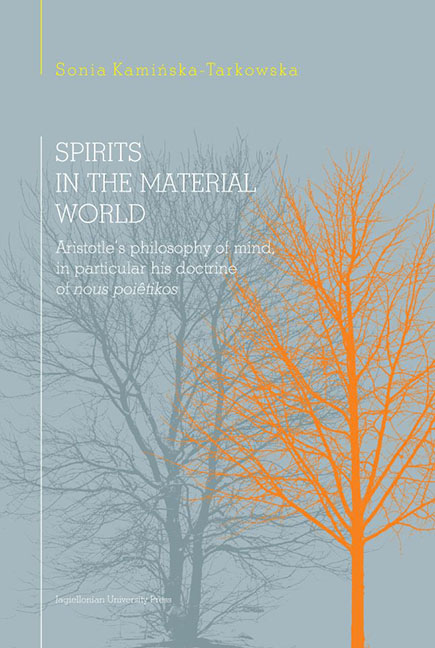 Spirits in the Material World
Spirits in the Material World Appendix
Published online by Cambridge University Press: 14 October 2023
Summary
A Perfect Life Gone Wrong
On several ways of achieving the perfect life and immortality and … failing
A precondition of writing this appendix is the fact that it has already been proven that there exists a tight relationship between the activity of nous poiêtikos (whatever it is) and happiness. I will devote this part to activating, deactivating and malfunctioning of the active mind to see what can prevent the perfect life from happening. I will be borrowing some of the terminology from power ontologies, which I find very useful for this purpose.
My aim
Instead of an epilogue, I would like to throw a proverbial spanner in the works and dwell on a problematic issue that emerges while working on nous poiêtikos, namely: can we turn it off, can we prevent it from acting, can we destroy it, can we choose not to use it? Below, I would like to present some issues concerning the activity of nous poiêtikos that arose during my work on Brentotle (in my papers, books and talks). I wish to follow in Tuominen’s footsteps and propose an experiment per impossibile. Namely, what if we turned off something which is in its very essence activity?
On and off? The big question about the switch
These are the questions I find important to ask here: What – if anything – activates the active mind? And can anything deactivate it or cause its malfunctioning? If yes – is there anything that deactivates it / causes its imperfect action or is this a lack of proper activation?
I will concentrate mainly on the analysis of De Anima 3.4 and 3.5. But I will also refer to Aristotle’s Ethics (Nicomachean and Eudemian), Metaphysics and De generatione animalium.
The power of nous. Basic assumptions
First of all, let us assume (very much like Franz Brentano) that nous is a power, and more specifically a bundle of two powers: one of them is passive (nous pathêtikos), see De Anima 3.4, and the other one – active (nous poiêtikos), see De Anima 3.5. ‘And in fact mind as we have described it, is what it is by virtue of becoming all things, while there is another which is what it is by virtue of making all things: this is a sort of positive state like light; for in a sense light makes potential colours into actual colours’ (DA 3.5). By passive I mean able to receive (become all things thinkable in this case) and by active – able to act (and necessarily doing so).
- Type
- Chapter
- Information
- Spirits in the Material WorldAristotle's Philosophy of Mind in Particular His Doctrine of Nous Poiêtikos, pp. 185 - 200Publisher: Jagiellonian University PressPrint publication year: 2022
